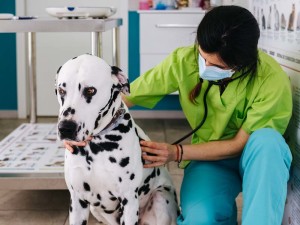How to Treat Acid Reflux in Dogs
Nobody likes it; how can you make it go away for your pup?

Share Article
In This Article:
How Do You Treat Acid Reflux in Dogs? How To Treat Acid Reflux in Dogs Naturally Acid Reflux in Dogs Treatments
It can often be tricky to figure out if a dog has acid reflux. But once you do, it’s important to make a targeted treatment plan to relieve their symptoms. You may not even realize all of the ways your dog was being affected by reflux until it’s gone and your pup’s bounce returns.
Reflux can be a nearly silent disease with subtle or vague signs that come and go. There is no specific test to diagnose reflux, but a collection of signs and exam findings. Dogs with reflux may experience pain, nausea, decreased appetite, restlessness, and other signs related to digestive problems, including vomiting, weight loss, bad breath, burping, stomach grumbling, or regurgitation. Treatments should be tailored to a dog’s specific signs and underlying medical problems.
How do you treat acid reflux in dogs?
You may notice a number of signs of acid reflux in dogs that have you wondering how to treat them and bring on relief. They range from a finicky appetite to extending their neck and hard-swallowing, to signs like coughing, vomiting, lip-licking, or drooling. This is because acid reflux causes stomach fluid to escape from the stomach and flow upwards into the esophagus. These fluids are acidic and very irritating. They can cause pain and inflammation within the esophagus and throat.

Treatments can target the problem in a number of ways. First, it is most effective to treat the underlying condition that is leading to reflux whenever possible. Additionally, some treatments will aim to make the stomach acid less acidic, so it is less irritating to the esophagus. Other treatments may help to reduce how much stomach acid is present or to speed up how fast their stomachs empty. Depending on your dog’s specific condition, some of these treatments will be more effective than others.
How to treat acid reflux in dogs naturally
Home remedies for acid reflux focus primarily on lifestyle changes that can improve digestion and reduce the amount of stomach acid present. These are best used in dogs with mild reflux, or in conjunction with more targeted medical treatments for more severe cases. Lifestyle modifications are not enough to bring relief to more severe cases on their own. Some important modifications to make at home are:
Dietary changes: Simplify your dog’s diet to a single formulation of dog food and temporarily eliminate all treats and table scraps. For dogs with signs of food allergies, it is best to select a hypoallergenic diet. If your dog seems to be improving on a specific diet, you can slowly start to reintroduce treats one at a time, as long as they do not interfere with specific diet trials your vet has recommended. Be sure to watch for returning signs of reflux and eliminate any treats or foods that seem to be a trigger.
Smaller, more frequent meals: Small, frequent meals allow the stomach to empty more quickly. It also ensures the stomach is never empty for too long, which can also cause problems for some dogs with reflux. The goal should be three to four feedings per day, including one in the evening to prevent a long stretch of emptiness overnight. Prolonged fasting is not recommended, particularly for small dogs.
Bland food: Certain foods can trigger reflux including foods that are highly acidic, as well as foods that are high in fat. Stick to a simple dog food diet without any ingredients or extra treats that may cause a flare-up.
Regular exercise: Exercise is important for so many reasons including helping dogs to maintain a healthy weight and receive the enrichment they need. It can also have additional benefits for dogs with reflux because regular exercise can improve motility in the digestive tract. This means it helps foods move through the stomach and into the intestines more quickly, preventing stomach acid from sitting in the stomach and refluxing into the esophagus. If your dog has not been exercising regularly, be sure to start slowly and gradually increase their activity over time to prevent injuries.
Natural antacids: Antacids are foods or medications that help to reduce the acidity of the stomach fluids. Foods that are more alkaline, or have a higher pH, can promote lower acidity. The amount of these foods that a dog eats is not usually enough to make a major difference, however. Some foods that can help are yogurt, banana, melon, or cauliflower. It is always important to introduce one new food at a time and start with a very small amount to ensure your dog tolerates it. This is especially important for dogs with a history of digestive problems and/or food intolerances. Other natural antacids that may be safe for people are not always safe for dogs and some may even be toxic. Be sure to consult your vet before trying herbs or supplements intended for humans.
Probiotics: Probiotics provide beneficial microbes to the gut, which can help with digestion and many other processes in the body. They have the most direct effect in the intestines, not the stomach, but can be helpful in some cases of reflux. This includes conditions where the underlying problems are caused by inflammation within the intestines, such as allergies or inflammatory bowel disease. Probiotics may also help to improve motility in the digestive tract.
Acid reflux in dogs: Medical treatments
Many times, dogs with ongoing reflux will need targeted medical interventions along with lifestyle changes to bring them relief. Whenever possible, it is best to get a specific diagnosis for a dog's reflux and to treat the underlying cause. This is the best chance for a long-term cure, as opposed to just treating the symptoms.
Antacids: Medications that act as antacids can reduce the acidity of stomach fluid, making the fluids less irritating to the tissues in the esophagus and throat.
Proton-pump inhibitors: These drugs, including omeprazole, work to block the production of acid in the stomach.
Gastroprotectants: Some medications like sucralfate, can coat the lining of the esophagus and stomach and act to protect these tissues from acid. This is helpful as a temporary measure to relieve inflammation within the esophagus and/or to protect ulcers and give them a chance to heal.
Promotility drugs: Drugs like metoclopramide promote emptying of the stomach and improve movement within the digestive tract. This can prevent stomach acid from sitting too long.
Surgical intervention: Some conditions may require surgical intervention to correct the underlying cause of the reflux. This may be recommended for dogs with more severe anatomical abnormalities, such as hiatal hernias, which are more common in brachycephalic breeds. Some diagnostic tests, like endoscopies, also require general anesthesia and may be very helpful for getting a diagnosis and making a targeted treatment plan.
It’s important to note that many of these medications are not recommended to use long-term; they have side effects and many lose efficacy over time. Many of them may not be safe for patients with underlying kidney disease, diabetes, etc., so vets use them sporadically to control symptoms. Meanwhile, we aim treatment at diet and lifestyle changes and surgery when necessary.
When to seek expert help for acid reflux in dogs
It is always a good idea to seek veterinary care if your dog is acting sick or has sudden changes in their behavior. This is especially important if you suspect your dog has reflux or you notice some vague signs and aren’t sure what’s going on. Reflux can be difficult to identify, especially if you have not had experience with the signs of reflux in dogs.
Your vet can help you understand the full picture of what’s going on and the underlying cause for your dog’s reflux. Veterinary care is also very important in helping your dog get relief. Home remedies may reduce some discomfort from reflux but most dogs will need medication to make the most improvement. Any dog with ongoing, severe signs including frequent vomiting, loss of appetite, weight loss, coughing, or difficulty breathing should see a vet immediately as these could lead to life-threatening complications.
Many brachycephalic dogs may experience mild gastrointestinal signs that can be corrected with an upper-airway surgery for brachycephalic obstructive airway syndrome (BOAS). If you have a brachycephalic dog, and they are experiencing any of the above symptoms, please speak with a veterinary surgeon. There are also numerous other conditions that can mimic reflux, including esophageal motility disorders, congenital abnormalities, systemic illnesses, gastric foreign material etc.
Typically, we treat symptomatically for a short time with medication and diet/lifestyle change and if there is no improvement in symptoms, of if the symptoms recur, then further work-up is indicated. This workup may include specialized blood work (cortisol testing, GI panels, complete blood count, serum biochemistry, etc.) radiographs, ultrasound, swallow studies, endoscopy, etc.
Bottom line
There are many different ways to treat acid reflux and most dogs will do best with a combination of medications and lifestyle changes.
Reflux can be caused by many different conditions and treating the underlying cause is the most effective way to bring your dog long-term relief.
It is best to consult a vet to get a clear diagnosis and start a targeted treatment plan, especially if your dog’s signs are severe or persistent.
References
Cheng, J, et al. “Gastroesophageal Reflux Disease and Probiotics: A Systematic Reviewopens in new tab.” Nutrients, vol. 12, no. 1, 2 January 2020, pp. 132.
Han, Jihee, et al. “Treatment of Gastroesophageal Reflux Disease in 2 Young Dogsopens in new tab.” Journal of Veterinary Clinics, vol. 38, no. 5, 31 October 2021, pp. 231-234.
Marks, Stanley. “Oesophageal Disorders In Dogs - More Common Than You Think!” University of California, Davis, School of Veterinary Medicine,
Muenster, M, et al. “Gastro-oesophageal reflux disease in 20 dogs (2012 to 2014)opens in new tab.” Journal of Small Animal Practice, vol. 58, no. 5, May 2017, pp. 276-283.
Savvas, Ioannis, et al. “Factors Affecting Intraoperative Gastro-Oesophageal Reflux in Dogs and Catsopens in new tab.” Animals, vol. 12, no. 3, 20 January 2022, pp. 247.

Dr. Amy Fox, DVM
Amy Fox, DVM is a small animal veterinarian in New York City with over thirteen years of experience in a mixture of general practice, emergency medicine, and shelter medicine. A lifelong animal lover, Dr. Fox studied biology in college and then worked as a veterinary nurse before pursuing veterinary school at Cornell University. Her expertise includes surgery, dentistry, and management of chronic conditions, and she is interested in toxicology, pain management, nutrition, care of senior pets, and educational outreach. Dr. Fox also enjoys writing about veterinary medicine and teaching, and her work has previously appeared in Spruce Pets. In her free time, she loves to cook, garden, go for long runs, and hang out with her goofy mixed-breed dog May, who provides never ending comic relief!
Related articles
Can Dogs Get a Stomach Bug?
No one likes it when their tummy hurts.
Can You Give Dogs Tums?
Learn what’s safe to do when they have tummy troubles.
![A pet parent checks their dog's stomach.]()
DIY Physical Exam Part 4—How to Examine Your Dog’s Stomach and Skeleton
Veterinarian Dr. Shea Cox on how to properly examine your dog’s stomach and musculoskeletal system.
![Dalmatian and Great Dane mixed dog at the vet being checked on by a nurse in bright green scrubs]()
Why Is Your Dog’s Stomach Hard? What to Give a Bloated Dog
And when to be concerned.
Why Does Your Dog Burp So Much?
You love your pup, but that’s... pretty gross.
![dog cuddling their pet parent on the couch]()
Why Does My Dog Throw Up Yellow Bile?
It’s not a pretty sight, but it’s important to know what’s going on.







